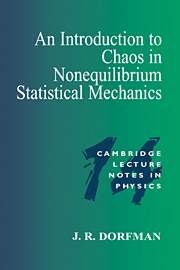Book contents
- Frontmatter
- Contents
- Preface
- 1 Nonequilibrium statistical mechanics
- 2 The Boltzmann equation
- 3 Liouville's equation
- 4 Boltzmann's ergodic hypothesis
- 5 Gibbs' picture: mixing systems
- 6 The Green–Kubo formulae
- 7 The baker's transformation
- 8 Lyapunov exponents, baker's map, and toral automorphisms
- 9 Kolmogorov–Sinai entropy
- 10 The Probenius–Perron equation
- 11 Open systems and escape rates
- 12 Transport coefficients and chaos
- 13 Sinai–Ruelle–Bowen (SRB) and Gibbs measures
- 14 Fractal forms in Green–Kubo relations
- 15 Unstable periodic orbits
- 16 Lorentz lattice gases
- 17 Dynamical foundations of the Boltzmann equation
- 18 The Boltzmann equation returns
- 19 What's next?
- Bibliography
- Index
6 - The Green–Kubo formulae
Published online by Cambridge University Press: 25 January 2010
- Frontmatter
- Contents
- Preface
- 1 Nonequilibrium statistical mechanics
- 2 The Boltzmann equation
- 3 Liouville's equation
- 4 Boltzmann's ergodic hypothesis
- 5 Gibbs' picture: mixing systems
- 6 The Green–Kubo formulae
- 7 The baker's transformation
- 8 Lyapunov exponents, baker's map, and toral automorphisms
- 9 Kolmogorov–Sinai entropy
- 10 The Probenius–Perron equation
- 11 Open systems and escape rates
- 12 Transport coefficients and chaos
- 13 Sinai–Ruelle–Bowen (SRB) and Gibbs measures
- 14 Fractal forms in Green–Kubo relations
- 15 Unstable periodic orbits
- 16 Lorentz lattice gases
- 17 Dynamical foundations of the Boltzmann equation
- 18 The Boltzmann equation returns
- 19 What's next?
- Bibliography
- Index
Summary
Linear response theory
Linear response theory describes the changes that a small applied external field induces in the macroscopic properties of a system in equilibrium. The external field is supposed to be turned on at some initial time, when the system is in equilibrium, and then treated as a perturbation. As an example of linear response theory, we show how to use it to obtain the time–correlation-function expression – often called the Green–Kubo expression – for the electrical conductivity of a system that contains charged particles. If the applied electric field is small enough that heating effects can be ignored, then Ohm's law can be expressed as Je=σE, where Je is the electrical current density, E is the applied electric field, and σ is the electrical conductivity that we wish to compute. The time-correlation formula is an example of a set of formulae which relate transport coefficients in a fluid to time integrals of timecorrelation- functions. In the last section of this chapter, we will give an example of the derivation of such formulae for the case of tagged particle diffusion. First, we wish to examine one particular derivation of the formula for the electrical conductivity which has provoked a great deal of very instructive discussion, which, in turn, is closely connected to the general theme of this book.
Information
- Type
- Chapter
- Information
- Publisher: Cambridge University PressPrint publication year: 1999
